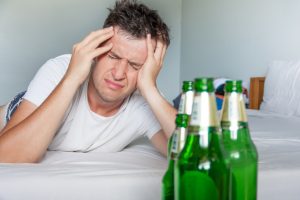 A nightcap can be a relaxing way to finish off the day. But it can also be robbing you of valuable sleep.
A nightcap can be a relaxing way to finish off the day. But it can also be robbing you of valuable sleep.
Alcohol may make you feel a little drowsy—it’s a depressant after all, but that doesn’t mean it’s good for sleep.
Advertisement
A new poll from the American Academy of Sleep Medicine (AASM) suggests that nearly 70% of Americans have lost sleep from drinking alcohol too close to bedtime, while one in five report it as a regular occurrence.
There are a host of negative effects that alcohol can have on sleep. And you don’t need to have much of it either. Even moderate intake is associated with sleep trouble. Moderate drinking too close to bed can reduce melatonin production, disrupt circadian rhythm, and increase the likelihood of fragmented sleep.
Alcohol can harm sleep by:
- Creating or exacerbating sleep disorders like insomnia and sleep apnea
- Interfering with normal breathing by relaxing the muscles in the head, neck, and throat
- Increasing the need to wake up and urinate, particularly in the second half of the night
- Boosting the risk of sleepwalking and sleep eating
- Disrupting sleep and causing next-day fatigue
There are several ways to avoid these risks to limit the influence alcohol can have on sleep. They include:
- Avoiding alcohol within three hours of bedtime.
- Increase water intake. Try to have at least two glasses of water for every one alcoholic drink. This will help flush alcohol from your system more quickly.
- Try to avoid bubbly drinks that can boost the risk of bloating and gas.
- Have a very light snack before bed. Easily digestible foods won’t keep you awake, and they may help limit blood alcohol concentrations.
Drinking increases during the holidays, as it can be nice to sit back and enjoy holiday music or movies with a toasty beverage. Just don’t make a habit out of it. Try keeping alcohol consumption to the afternoon or early evening to help you get better sleep.
